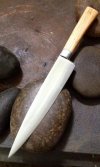I love the way convex edges perform with my kukris and big chopping blades. However I also have a couple of smaller HI blades which have similar type blade geometry but vary in length between 4 -7", I also have a couple of small blades by custom makers which are relatively thick with convex edges, but too short for chopping. My question is directed to owners of similar small knives with thick blades. What kind of tasks do you use them for, and why do you choose the thicker bladed knife for the task as opposed to a thinner bladed, more conventionally ground blade? Hope to hear some interesting opinions here and get some new ideas for using my smaller blades. An example would be in the kitchen, if you need to cut through chicken bones or crab shells there is the thick bladed western deba approx 4-5mm thick.
Last edited:


